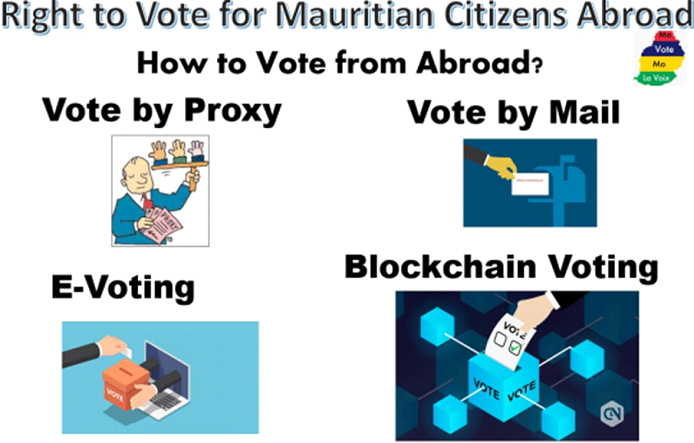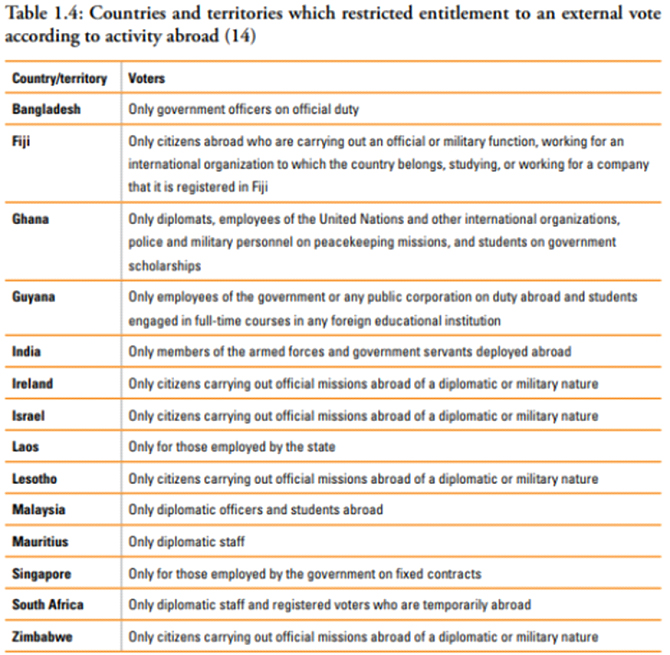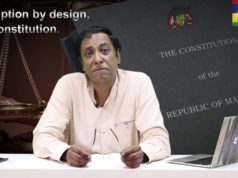“Someone struggled for your right to vote. Use it.” – Susan B. Anthony
It is estimated there are currently 300,000 Mauritian Nationals who are studying, working or settled abroad (an accurate figure is not available from Statistics Mauritius).
In most cases, during a General Election, these citizens are not able to exercise their Rights to Vote unless they forked out tens of thousands of Rupees and flew back to Mauritius to attend their registered polling stations on Election day. This situation has been unchanged for all the past General Elections (2019, 2014, 2010, 2005, etc) in the country.
At the last General Elections in November 2019, there were 941,719 individuals registered to vote. However, only 725,236 people actually went to their allocated Polling Stations to cast their votes. 216,483 voters had not voted at the last General Elections. Out of that 216483, it is estimated a proportion consists of Mauritian Citizens who were abroad at the time of Election.
If we consider that proportion to be 50%, that figure translates into over 108241 Mauritian Citizens who have not been able to exercise their Right to Vote as per the Constitution of Mauritius, due to the restriction on Vote by Proxy and Postal Vote.
As more and more students move abroad to study (with parents increasingly inclined to send their kids to Australia, US, Europe, etc) and more people move abroad to work for a specific period, this number is set to increase dramatically. These people, who would normally have plans to return back to Mauritius after their studies or work, therefore did not have the opportunity to cast their votes on choosing the next Government through a General Election.
As an example, consider someone who is 20 and is currently studying for a 3-year Masters’ degree in Australia since September 2018. That person would not have had the opportunity to vote at the General Elections on 7th November 2019 because they were not in the country at the time. This is also because of the lack of options to vote from abroad. Ultimately, that person has not had a voice in deciding who would govern the country, for the next 5 years, where he/she would return to after graduating in 2021.
In addition to the above, there are also thousands of Mauritian Citizens abroad who have not had the opportunity to vote because, along-with not having the facility to vote, they were also not registered to vote. Therefore, there could be well over 108241 citizens who could not exercise their Right to Vote due to being abroad.
According to the Constitution of Mauritius Article 44 (1) Right to Vote at Elections, every citizen of Mauritius has the right to vote, as long as their names are on the register of electors. This is also well stipulated in Section 75 (1) of the Representation of the People Act:
“No person shall be entitled to vote at an election for any electoral area unless his name is on the register of electors in force for that electoral area.”
There is however no restriction on location/place of residence. The law states it clearly, as long as your name is on the register of electors, you are entitled to vote at an election.
So, how do Mauritian Citizens abroad exercise their Constitutional Right to Vote?
Well, there are solutions already in place, and that are used effectively in other countries:
1. Voting by Proxy
2. Postal Vote (Mail Voting)
3. E-Voting (Internet Voting)
4. Blockchain Voting

In Mauritius, currently, the Electoral Commission stipulates that Voting by Proxy is only restricted to Police staff, Election Officers, Service Electors, and Candidates nominated for election, as per the below guidelines from the Electoral Commission.
Voting by proxy is restricted to certain categories of persons according to the regulations of the relevant elections e.g. for the National Assembly Elections only the following persons are entitled to vote by proxy:-
(a) members of the Police and election officers engaged in the performance of duties on election day;
(b) Service electors or any elector other than a service elector who is –
- (i) serving as Ambassador, High Commissioner or other principal representative of Mauritius abroad; or
- (ii) a public officer performing duties on behalf of the Government of Mauritius under a person specified in sub paragraph (i); or
- (iii) a member of the family of a person specified in subparagraph (i) or (ii) and forms part of his household abroad;
(c) any candidate duly nominated for election;
(d) any public officer who is an elector in Rodrigues and who is serving in the Island of Mauritius; and
(e) any public officer who is an elector in any constituency in the Island of Mauritius and who is serving in Rodrigues.
In contrast, in the UK, every British citizen residing overseas for a maximum of 15 years, is allowed to vote by post or by proxy, subject to certain administrative criteria being met (Source: https://www.electoralcommission.org.uk/i-am-a/voter/overseas voters/). British Citizens abroad also have the right to register to vote at their allocated constituency (Source: https://commonslibrary.parliament.uk/research briefings/sn05923/).
The International IDEA Handbook 2007 stipulates that Mauritius is part of the 28 African nations that allow External Voting (Voting from abroad). However, unlike other African countries, as per the table below, Mauritius only allows for Diplomatic Staff to vote. (Source: https://www.idea.int/sites/default/files/publications/voting-from abroad-the-international-idea-handbook.pdf)

So, how do we proceed? I have simplified this into two simple parts
1. Postal Voting, unlike Voting by Proxy, is not stipulated as an exclusive right to diplomatic individuals, neither is e-Voting nor Blockchain Voting. Therefore, Mauritian Citizens abroad should be given the opportunity to vote at a General Election through either Postal Voting, e-Voting or Blockchain Voting. This is a facility that would have to be explored and implemented by the Electoral Commission.
2. In addition to the above explained logistics around voting for Citizens abroad, the Registration of Electors should be carried out online and open to ALL citizens so that Mauritian Citizens living abroad can register to vote legally in their allocated Constituencies (based on past registration or home address). This is important in order to fulfil the requirements of Section 44(2) of the Constitution of Mauritius and Section 75 (1) of the Representation of the People Act. Online registration of voters can be carried out via a system of strict checks (National ID checks, Passport Number checks, Address checks etc) and by applying the latest KYC techniques used within RegTech (Regulatory Technology) (Source: https://www.ibm.com/blogs/regtech/the-role-of-technology as-the-backbone-of-aml-and-kyc-processes/)
If you do not have the opportunity to vote despite having the right to vote, that is NOT a ‘right’!
Thank you for reading. Please sign the petition for the Right to Vote for Mauritian Citizens abroad here: https://secure.avaaz.org/community_petitions/en/Electoral_Commisioner_of_Mauritius_Vote_by_PostProxy_for_Mauritian_citizens_abroad/
Vashist B. Parsunoo
www.facebook.com/MoVoteMoLavoix
“Voting is the expression of our commitment to ourselves, one another, this country and this world.” – Sharon Salzberg












Great read and well-thought article on one of the most important and fundamental rights of a functioning democracy. The current structure (or lack of it!) is denying 10-15% of the voting population of their birth and constitutional right! I like that you made a point emphasizing on registered voters that are already on the voting register. There is another class of citizens – they are Mauritians by birth, or descendants of Mauritian parents and primarily live outside Mauritius – and according to the constitution, they also have the right to vote.
I would suggest tackling the issue as two groups of voters:
The first group is the group of voters that are already listed on the register to vote. I think there is a strong case to be made here against the electoral commission and the government to demand (not the right to vote), but a mechanism to vote. You outlined several great ones in the article. I’m not a legal expert, but I think there is ground for legal pursuit here.
The second group is the group of non-registered voters. This is a bit more complex, as according to the electoral commission (I think), they need to provide a local residential address within a ‘circumscription’ of where they will cast their vote.
The constitution does not question that non-residents cannot vote, but it is a valid question to ask of why a non-resident Mauritian should be given the right to vote when for example he/she makes no tangible contribution to the local community (municipality, etc..) or to the Mauritian community. Most non-residents don’t pay taxes in Mauritius. In a way, it’s the reverse of the situation of where I live – I live in Washington DC and my license plate says: Taxation Without Representation. This is because residents of DC pay taxes, but DC is not recognized as a state (for political reasons, DC is 90% Democrats and will give the democratic party two extra senators against the republican party ) and has no representative in Congress/parliament.
In closing, I would say under the current constitution, let’s go for the low hanging fruits – the first group: non-residents that are already on the voters’ list. Pressure the electorate commission and the Govt for a way to vote.